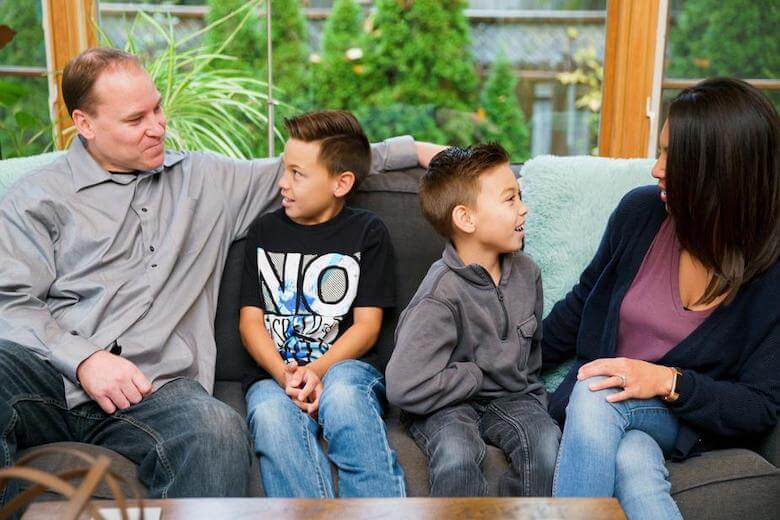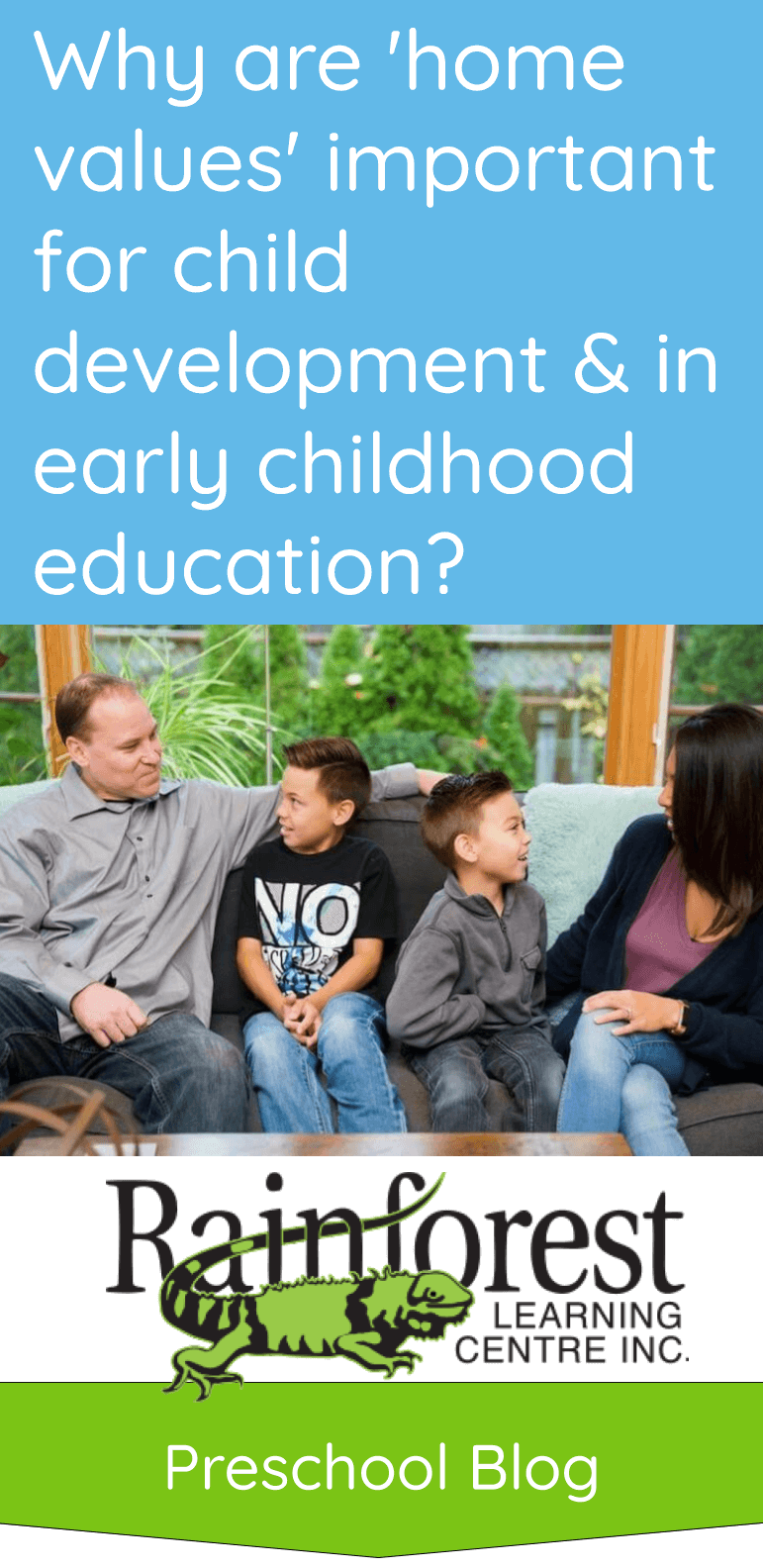
When we talk about home values for child development, we are not talking about the prices of property, nor any school district catchment area. Home values in the context we will write about here have to do with the behaviours that are deemed ‘important’ to a child’s family, while they are in their home environment. These practices, understandings and cherished behaviours can extend into a child’s life outside the home.
In this article, we’ll explain why home values are important for child development, and how they affect early childhood education.
How are home values developed and defined in childhood?
A child’s home environment is where they first learn basic human skills. This can happen by teaching, imitation, experimentation through play, and so on. For example, language is learned at home by listening, imitating and practicing.
In some cultures, sitting at the table when we eat, saying grace before eating, shaking hands with new people we meet, or kissing guests on both cheeks can also be learned behaviours. These are also values. That is, culturally, the family places significant importance on these rituals and habits. Without words being necessary, they communicate messages to others, such as acceptance, being grateful or respect for a social situation or person.
Being polite, respecting elders, cleaning up after play, helping with chores, saying things like ‘I love you,’ ‘please’ and ‘thank you’ are all values that children learn at home, before they enter society (so to speak), and go to daycare, preschool or kindergarten.
As we can see, these ‘home values’ have a lot to do with the way a child is raised. For example, if children are taught by caregivers about money skills early in life, or taught to solve problems, be independent, build self-confidence, get along with others, eat healthy, tell the truth and so on, these become a person’s values later in life.
Education is another example of a value. In many cultures and households, getting a good education is one of the topmost home values. Kids are encouraged to develop literacy in early childhood, and are told that they may be doctors or lawyers one day. When kids reach grade school, parents may require that homework is finished before they can play. That is a value. Meaning: education is more important than having fun.
On the contrary, if a child is never taught to be thankful or polite, when they enter society, they may have problems forming relationships. Of course, it’s expected kids will fight over toys, but at some point, kids should be learning to take turns, wait their turn, share or otherwise place more value on the friendship than the object.
There can also be problems with values when a child’s home environment is not a nurturing one. According to the UN, a child, “for the full and harmonious development of his or her personality, should grow up in a family environment, in an atmosphere of happiness, love and understanding.”
And, in this article on the Unicef website, a child should be taught:
Socio-emotional and cognitive competencies and providing directions and guidance in daily life. Providing a safe and stimulating home environment, which allows children to play, explore and discover, is a critical piece of this process and can exponentially increase a child’s chances of flourishing, attaining an optimal level of development and later becoming a responsible and productive adult.
The Unicef article also mentions the following, which emphasize even more our point that home values are actively formed in early childhood:
Caregivers’ effective and responsive care in the first five years of life, includes daily parental guidance, responsive and adequate feeding practices, appropriate caregiver-child interactions (positive emotionality, sensitivity, and responsiveness towards the child, avoidance of harsh verbal or physical punishment). All these practices represent forms of family investments into children’ long term well-being.
And so, how caregivers act as models to their children, can also impact a child’s values, since they stem from their home environment.
How can early childhood educators use home values in their preschool curriculum?
On the one hand, early childhood educators can be thought of as teachers of facts. You know: colours, shapes, numbers, letters and the typical, age-appropriate school subjects for a young group of tots. However, early childhood education – and even education as a whole – can be thought of in a much wider sense.
The point of any educational system is to prepare pupils to be functioning members of society as adults. So, with that in mind, some educational theories emphasize that the job of a teacher is to build up the cognitive and emotional development of a child, too. In fact – even physical development and health is taught at school. Think of P.E. class, for instance.
In early childhood education, we have the important role of starting children off, and preparing them for the formal school environment. So at this stage, social skills, which encompass a person’s values, are really important (as are many other child development milestones!).
It is therefore beneficial for a preschool teacher to consider how they can reinforce home values, or bring positive values into the home. This of course takes coordination and open lines of communication with parents.
For example, at our daycare, we teach children about recycling. This gets told to the parents, who encourage children to bring in their recycling to the classroom. Parents can reinforce this value at home, by teaching children where the recycling goes.
We also host grandparents days. We let the parents know how to prepare for these events, and it is a mutual way for us to work together as a community to show children that we should show respect, love and admiration to our grandparents.
On the other hand, we may teach a child about cleaning up after eating. The child can use this behavioural value at home, even if they typically aren’t expected to do so in that environment.
Imagine how impressed a parent might be if they see their child throwing their snack wrapper in the garbage at home, without being asked! But in reality, these habits won’t be as effective as when daycare, preschool or kindergarten are aligned with home values. It takes a village to raise a child, and to show kids that we all appreciate and expect these positive behaviours, while we demote the negative ones.
The thing about values, though, is that we can’t always say they are right or wrong. Obviously, abusiveness and imbalanced parenting should not be considered valuable to our society. But in a lot of cases, values can be cultural. They can be based on religion practiced in the home, or traditions that are common in a country where parents may have originated from.
Educators need to be aware of this, since part of their job is to emphasize and reinforce the positive home values, which may or may not be different from the ones they grew up with.
So, some ways of being inclusive – as well as practical – when using home values in early childhood education curriculums are:
- Exposing children to different cultures and customs, by working them into the curriculum calendar. For example: show children not just what Christmas is like, but also Hanukkah and Diwali (especially if there are children from those cultures in your classroom, or your neighbourhood includes these cultures).
- Teaching children to say thank you and show appreciation for workers around the school who do important jobs, but could be from a different socio economic class or culture. For example, you can find many heart warming, tear-jerking videos of classrooms thanking and surprising their school janitor. It’s a great idea to pass on! Don’t forget your garbage pick up and recycling guys, the firemen, the secretary, and whomever else does important work in their neighbourhood!
- Teach phrases and words in different languages. Canada is so multicultural, it’s hard to not find a language spoken in this country. However, especially if your classroom has pupils who speak languages other than English at home, you can teach words from those languages. Or, ask the kids who speak other languages to share them with the other kids. Learn to say hello in Chinese, Hebrew, Punjabi, Arabic, Japanese, Korean, French, Spanish, sign language and any other language group represented in the class. Then, move on to, ‘how are you?’ and ‘thank you’ and any other phrase the class wants to learn.
- Don’t force kids to do activities that may go against their home values. This can be an extremely sensitive topic, and one that needs to be determined case-by-case. But for example, some families don’t celebrate holidays like Christmas or Halloween for their own reasons. That’s ok: it doesn’t hurt anybody to not do these activities. If the child is ok with it, they can paint stars and planets instead of doing a Christmas craft. If a child’s home values go against eating meat, be accommodating, and avoid any ‘annoyed’ looks when it comes to snack prep. And so on. Kids should not feel like being different means that something is wrong with them. Teach the class to be accepting, too.=
To conclude: home values are an important part of early childhood education and development
As we’ve seen above, home values can be important cultural learning points for how we behave in society. They are learned early in life, along with skills like language and physical and cognitive development. Children see and hear values modelled to them too – so parents and caregivers need to be attuned to how they act, since it affects how children act, too.
Home values can also change from household to household, but that doesn’t mean there is necessarily a right or wrong set of values we all need to follow, with the exception of the ones that are obviously inappropriate, and which our societies should protect children from.
Early childhood educators can reinforce common home values by including them in a preschool classroom schedule and learning objective. These can be as simple as learning to listen while a teacher or adult is talking, or cleaning up after eating. It can also be inclusive by incorporating traditions and language learning from other cultures. And, most importantly, teachers can demonstrate values of acceptance and accommodation towards many types of people, for their early learners.
